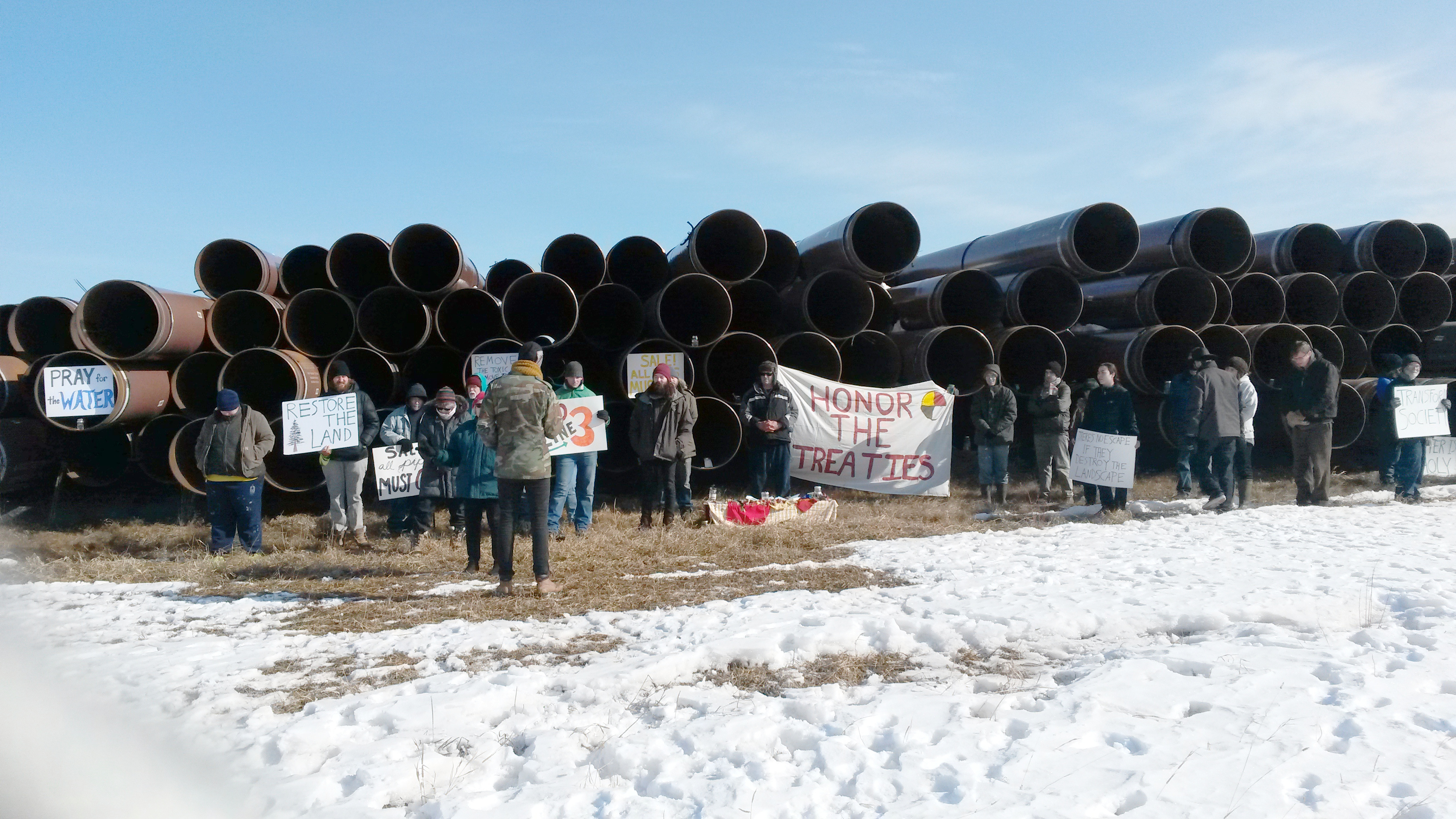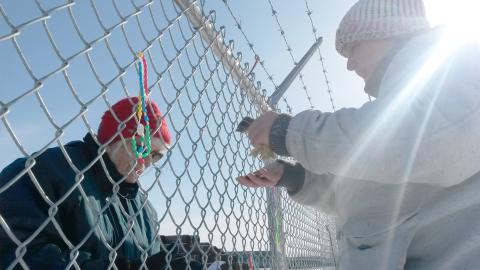
Protesters from the 2018 Midwest Catholic Worker Faith and Resistance Retreat in Duluth, Minnesota, risk arrest as they stand near an "Honor the Treaties" banner and a makeshift altar in Carlton County, Minnesota, April 9 to protest a proposed Line 3 pipeline project. (NCR/Maria Benevento)
A Catholic Worker retreat culminated in an action at a pipeline storage facility April 9 in Carlton County, Minnesota, where 27 people risked arrest for trespassing when they occupied the yard with banners, signs, jars of blessed water and sacred objects in an effort to "transform" the space and oppose a pipeline project.
"We're hoping that the prayers that we leave behind and the sacred items that so many people have put in … will have an effect," Brenna Cussen Anglada of St. Isidore Catholic Worker Farm in southwest Wisconsin told NCR the night before she risked arrest. "For a lot of us, we believe we're acting in cooperation with God's grace and, ultimately, God and love win out over evil."
The Midwest Catholic Worker Faith and Resistance Retreat, held April 6-9 in the Unitarian Universalist Congregation of Duluth, was almost entirely focused on education, relationship building and action planning related to opposing the proposed Line 3 pipeline project in Minnesota.
Enbridge, the pipeline company, commonly refers to the project as a "replacement" of outdated pipes, but the Catholic Worker group and indigenous activists said the plan constitutes an "abandonment" of old pipes and an expansion of the pipeline through an alternate path that would threaten areas sacred to local indigenous people.
The pipeline currently cuts through the Fond du Lac and Leech Lake reservations, both located in Minnesota and home to groups of the Anishinaabe people. The proposed re-routing would skirt the reservations, but cross wild rice lakes that the Anishinaabe consider sacred and where they have the right by treaty to hunt, fish and gather.
Since the company does not have the necessary permits to start construction, a high level of confrontation with Enbridge was not possible or necessary, but "we can still invite them to transform what they have already done," said Michele Naar-Obed, a retreat organizer and member of Hildegard House Catholic Worker in Duluth.
Almost all of the approximately 60 retreatants attended the action along with a few additional protesters. Most were current or former members of the Catholic Worker movement — a decentralized network of houses of hospitality and farms whose members usually live in community, practice the works of mercy and protest violence and injustice. College students, extended community members, indigenous activists and others also attended.
Carrying signs and banners with slogans such as "Honor the Treaties," "Defend the Sacred," "Green Energy Now," "Pipe Organs not Pipelines," "Pipes Leak," "Pray for the Water" and "Sale: All Pipes Must Go," protesters did not attempt to damage the pipeline materials.
Instead, they placed jars of blessed water inside pipes and created a makeshift altar covered in sacred items they had collected over the past few months, including a carving of Jesus that belonged to Catholic Worker founder Dorothy Day, contributed by her granddaughter Martha Hennessy. (Hennessy was recently arrested for breaking into a nuclear weapons base as part of the Plowshares movement.)
Members of the group, who recorded their action in several livestreams on social media (posted on the retreat's Facebook page), also read a statement of purpose about the event, prayed, passed food and supplies back and forth through the fence, and sang songs modified to fit the occasion, such as "99 Pipes in the Pipe Yard."
Although the participants split into two groups based on whether or not they planned to risk arrest, with 27 entering the fenced-in yard where the pipes were stored while over two dozen others remained outside, law enforcement decided to let the protesters disperse naturally without making arrests. A small group remained until about 9 p.m.
Advertisement
Early that afternoon, Naar-Obed had told the group that "everything we envisioned happened," including placing the water and sacred items and receiving media attention from several outlets.
Some participants also emphasized that the action should be considered in the context of the whole retreat, which helped members integrate faith and action. It also provided them with knowledge and experience that they could apply to pipeline protests closer to home or use as inspiration for future actions near Duluth.
During the retreat, group members participated in a "blanket exercise," which visually represented colonization; visited the Fond-du-Lac Reservation; and listened to indigenous people talk about their spirituality, the effects the pipeline would have and efforts to oppose it.
"I think it's important to mention that it's called the Faith and Resistance retreat," said Steven Fisher from the Su Casa Catholic Worker in Chicago. "Because it's not just one or the other. … We came here on Friday to gather together and think in terms of how [the protest] intersects with our prayer life, our spirituality, our commitment to Christ."

Anishinaabe activist Jaclyn Furtman burns sacred plants in a traditional cleansing ritual known as smudging. (NCR/Maria Benevento)
A common theme in discussions was how the history of racism and oppression of native people affected the mainly-white Catholic Worker group's efforts to build trust with indigenous people and collaborate with them in opposing the pipeline.
"I told some native friends that I was with the Catholic Workers," one indigenous activist said during the April 9 action, speaking into his phone as he livestreamed the event, but raising his voice so the crowd could hear. "And they said, 'Oh no, not them again!' " Over the crowd's laughter, he explained that this group might not fit his friends' negative expectations of Catholics.
Ricky DeFoe, a local linguistic, cultural and spiritual leader, spoke at the "teach-in" portion of the retreat April 7 about the damage caused by papal bulls that gave America to Europeans without regard for native people, and the hierarchical Catholic worldview that people have "dominion over all things."
But DeFoe also brought up the themes of solidarity and mutuality, saying that descriptions of genetic differences "never tell you about the spirit — all of these things are superseded by the spirit."
Sheila Lamb, an indigenous activist who spoke after DeFoe, echoed this theme and emphasized that the pipeline issue affected everyone. "I don't want to see any more of our people suffer," she said. "Or any of yours."
Meanwhile, several retreat participants said they were motivated both by solidarity with indigenous groups and by their recognition that environmental concerns affect everyone.
"The native struggle for their land rights and water rights are now the struggle for the planet and the survival of the species," said Des Moines Catholic Worker Frank Cordaro. "Here in Duluth, the Catholic Workers are connecting with the native impulse for survival — which is happening all over the globe — and we're lending our voices, our life, our tradition to their efforts."
"We're trying to figure out how we can be the best allies" for the native community, said Naar-Obed, "recognizing that what they're fighting against and what they're fighting for affects all of us, not just the native community, although they take a bigger hit because of what it means to them in their culture."
Cussen Anglada said that while she was generally opposed to increased oil flow, knowing the indigenous community opposed the pipeline was an even stronger motivation for her action.
"Meeting those people who it will impact, it has even more strengthened my resolve to speak out against it, even if it's at a personal risk," she said, "because whatever happens to me I know will be a slap on the wrist compared to what's happening to them."
[Maria Benevento is an NCR Bertelsen intern. Her email address is mbenevento@ncronline.org.]








